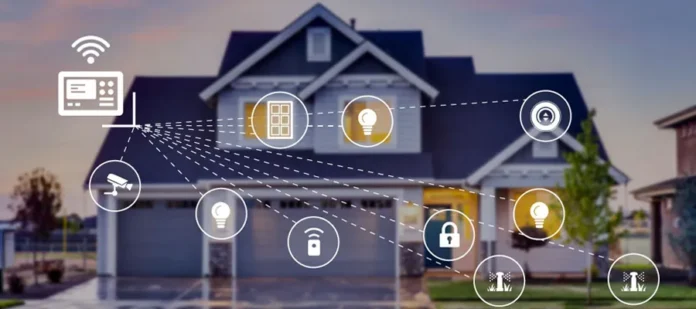In the age of rapid technological advancement, the concept of a “smart home” has shifted from the realm of science fiction to an integral part of contemporary living. With the convergence of innovative devices and the Internet of Things (IoT), homes are becoming more interconnected, efficient, and convenient than ever before. From automated lighting systems to intelligent security measures, the possibilities offered by smart home technology are reshaping the way we interact with our living spaces.
Understanding Smart Home Technology
At its core, a smart home is equipped with devices and systems that can be controlled remotely or programmed to perform tasks autonomously. These devices communicate with each other through a central hub or network, enabling seamless integration and coordination. Key components of a smart home include:
Home Automation: Smart thermostats, lighting, and appliances can be programmed to adjust settings based on factors like time of day, occupancy, and energy usage patterns. This not only enhances comfort but also helps reduce energy consumption and utility costs.
Security Systems: Smart security cameras, doorbells, and locks provide homeowners with real-time monitoring and control over their property. Integrated sensors and alarms can detect unauthorized entry or suspicious activity, sending alerts to homeowners and authorities if necessary.
Voice Assistants: Voice-controlled devices such as Amazon Alexa and Google Assistant serve as virtual assistants, allowing users to control various smart home functions using voice commands. This hands-free approach adds a new level of convenience and accessibility to everyday tasks.
Energy Management: Smart meters and energy monitoring systems track household energy usage in real time, empowering homeowners to identify inefficiencies and make informed decisions to optimize energy consumption. This promotes sustainability and reduces environmental impact.
Entertainment Systems: Smart TVs, speakers, and entertainment hubs offer immersive audiovisual experiences with integrated streaming services and personalized content recommendations. Advanced audio technologies enhance the viewing and listening experience, transforming living rooms into multimedia hubs.
Benefits of a Smart Home
The adoption of smart home technology offers a myriad of benefits for homeowners, including:
Convenience: With remote access and automated controls, homeowners can manage their homes from anywhere using smartphones or other connected devices. Whether adjusting the thermostat, checking security cameras, or turning off lights, convenience is at their fingertips.
Enhanced Security: Smart home security systems provide peace of mind by offering comprehensive surveillance and monitoring capabilities. From deterring burglars to alerting authorities in emergencies, these systems offer layers of protection for homeowners and their families.
Energy Efficiency: By optimizing energy usage through automation and smart controls, homeowners can reduce waste and lower their utility bills. Smart thermostats, for example, can learn occupants’ preferences and adjust heating and cooling accordingly, leading to significant energy savings over time.
Customization: Smart home technology allows for personalized settings and preferences tailored to individual lifestyles. Whether creating custom lighting scenes, scheduling automated tasks, or setting up voice commands, homeowners have the flexibility to customize their living spaces to suit their needs.
Increased Property Value: Homes equipped with smart technology often command higher resale values and attract tech-savvy buyers. As smart home technology becomes more mainstream, properties with integrated systems may offer a competitive edge in the real estate market.
Overcoming Challenges and Considerations
While the benefits of smart home technology are compelling, there are also challenges and considerations to address:
Compatibility: With a wide array of devices and platforms available, ensuring compatibility and seamless integration can be complex. Homeowners should research compatible products and ecosystems to avoid compatibility issues and maximize functionality.
Privacy and Security Concerns: Connected devices collect and transmit data, raising concerns about privacy and security. Implementing robust security measures, such as encryption and secure authentication protocols, is essential to safeguard sensitive information and protect against cyber threats.
Cost of Implementation: The initial cost of outfitting a home with smart technology can be substantial, especially for comprehensive systems and high-end devices. However, the long-term savings in energy costs and potential increase in property value can offset the initial investment over time.
Maintenance and Support: Like any technology, smart home systems require regular maintenance and updates to ensure optimal performance and security. Homeowners should factor in ongoing maintenance costs and consider warranty coverage and technical support options when investing in smart home technology.
The Future of Smart Homes
As technology continues to evolve, the possibilities for smart home innovation are limitless. Emerging trends such as artificial intelligence (AI), machine learning, and 5G connectivity promise to further enhance the capabilities and intelligence of smart home systems. From predictive analytics that anticipate homeowners’ needs to seamless integration with smart cities and infrastructure, the future of smart homes holds immense potential to redefine modern living.
In conclusion, smart technology represents a transformative shift in how we interact with our living spaces, offering unparalleled convenience, security, and efficiency. While challenges exist, the benefits outweigh the drawbacks for many homeowners seeking to embrace the future of home automation. As the industry continues to evolve and innovate, smart homes are poised to become not just a luxury but a standard feature of modern living.




